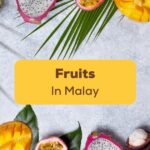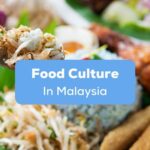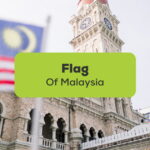Pregnancy and the arrival of kids are significant life events that bring joy, excitement, and challenges to families around the world, and in Hong Kong, where Eastern and Western influences coexist, these experiences are uniquely intertwined with traditional values and modern practices.
Language plays a crucial role in expressing the emotions and experiences associated with pregnancy and having a baby and that is why this time we will be examining Cantonese words for pregnancy and the cultural nuances of pregnancy and childbirth in Hong Kong.
Pregnancy In Cantonese: The Baby Journey Begins
In Cantonese, the word for pregnancy is “waai4 wan6” (懷孕), which literally translates to “holding a child within.” When a couple learns about their impending parenthood, they might excitedly tell their family and friends who will hear phrases like “ngo5 jau5 hei2 liu5” (我有喜了), which means “I am pregnant.” Phrases like “tim1 ding1 tim1 neoi5” (添丁添女) expresses the expectation of adding a son and a daughter to the family.
Pregnancy-related terms in Cantonese are filled with cultural significance. For instance, “wai6 jan4 mou5” (為人母) means “to become a mother.” This phrase not only refers to the physical aspect of motherhood but also the social and emotional transformation that comes with it. Similarly, “wai6 jan4 fu6” (為人父) means “to become a father.”
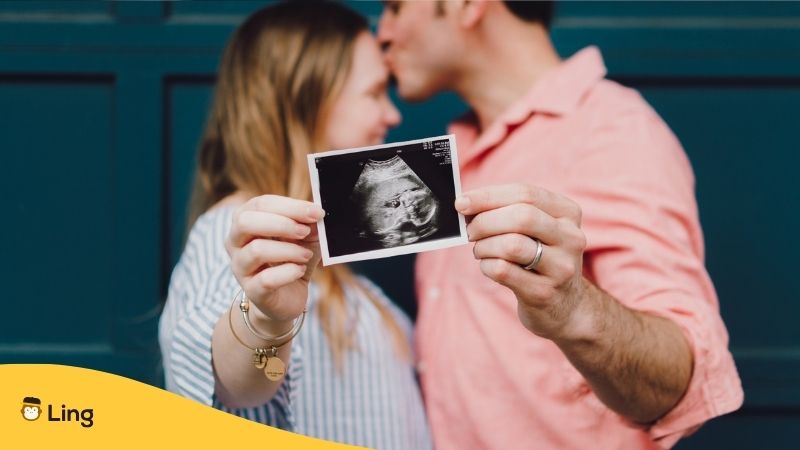
Navigating Pregnancy: Cultural Practices
Another important cultural aspect of pregnancy in Cantonese-speaking communities is the concept of “toi1 gaau3” (胎教), which refers to prenatal education. Expectant parents may play music or read to their unborn child, believing that these activities can influence the baby’s development and personality.
In Hong Kong, expectant parents often attend prenatal classes called “caan2 cin4 baan1” (產前班) to prepare for childbirth.
Modern Childbirth In Hong Kong
The techniques used to deliver a baby in Hong Kong have seen significant changes in recent years. While traditional practices still hold importance, modern healthcare facilities and approaches have become increasingly prevalent. The term for childbirth in Cantonese is “fan1 jing1” (分嬰), which literally means “delivering the baby.”
In the past, home births with the assistance of a midwife were common in Hong Kong. However, today, the majority of births take place in hospitals, where expectant mothers can benefit from advanced medical care. The shift towards hospital births has led to a more medicalized approach to childbirth, with epidurals and cesarean sections becoming more common.
Names And Blessings
Choosing a name for the unborn child is an essential part of pregnancy and childbirth in Cantonese culture. Names are believed to carry significant influence on a person’s life, and careful consideration is given to selecting a word with positive connotations. Naming a child often involves consulting fortune tellers and considering the child’s birthdate, horoscope, and the stroke count of the characters in their name.
Cantonese names are rich in meaning and symbolism. Parents may choose names that express their hopes and wishes for their child’s future. For example, names like “zeon3 jin4” (俊賢) and “jau1 ngaa5” (優雅) reflect the desire for the child to be talented and elegant, respectively.
Traditional names in Cantonese often include characters that symbolize virtues, such as “jan4” (仁) for benevolence, “ji6” (義) for righteousness, and “haau6” (孝) for filial piety. These values are deeply ingrained in Cantonese culture and are passed down from generation to generation.
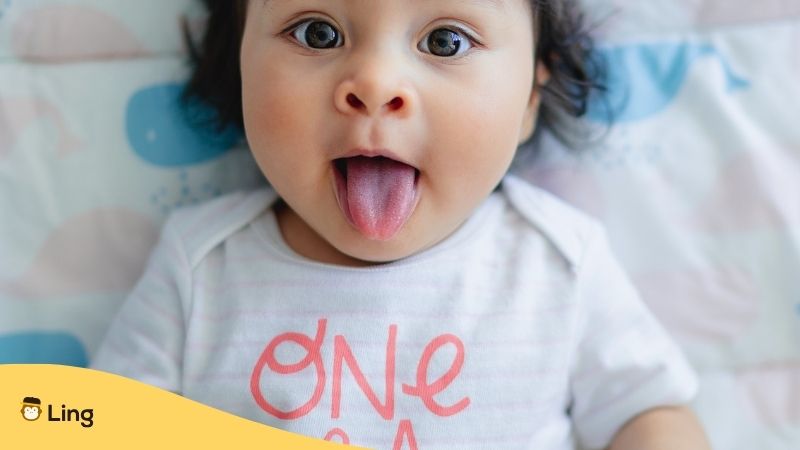
Welcoming The Newborn
Once the baby is born, several terms in Cantonese describe this momentous occasion. “ceot1 sang1” (出生) means “to be born,” while “san1 sang1 yi4” (新生兒) refers to a newborn baby. Friends and family often send gifts and congratulations to the new parents, and it is customary to provide “baak3 jat6 jim6” (百日宴), a celebration that occurs when the baby is one hundred days old. This event symbolizes the infant’s survival and good health during the vulnerable early days of life.
Postpartum Care and “坐月”
After childbirth, the mother enters a period known as “co5 jyut6” (坐月), also called “confinement.” This traditional practice is rooted in the belief that the new mother’s body needs time to recover from the whole tiring experience. During this time, the mother follows a strict regimen that includes dietary restrictions, such as avoiding cold foods and drinks and adhering to a diet rich in nourishing ingredients like ginger and sesame oil.
Some Useful Cantonese Words For Pregnancy
| English | Cantonese | Transliteration |
|---|---|---|
| Pregnancy | 懷孕 | Waai4 wan6 |
| Mother | 母親 | Mou5 can1 |
| Baby | 寶寶 | Bou2 bou2 |
| Fetus | 胎兒 | Toi4 yi6 |
| Ultrasound | 超聲波 | Ciu1 soeng1 bo1 |
| Maternity | 產房 | Caan2 fong2 |
| Obstetrician | 產科醫生 | Caan2 fo1 ji1 sang1 |
| Conception | 受孕 | Sau6 wan6 |
| Labor | 分娩 | Fan1 min5 |
| Delivery | 分娩 | Fan1 min5 |
| Contractions | 宮縮 | Gung1 suk1 |
| Morning Sickness | 早孕反應 | Zou2 wan6 faan2 jing5 |
| Prenatal Care | 產前護理 | Caan2 cin4 wu6 lei5 |
| Stretch Marks | 妊娠紋 | Jam6 san6 man4 |
| Cravings | 懷孕食慾 | Waai4 wan6 sik6 juk6 |
| Breastfeeding | 母乳哺育 | Mou5 juk6 bou6 juk6 |
| C-Section | 剖腹產 | Pau3 fuk6 caan2 |
| Postpartum | 產後 | Caan2 hau6 |
| Midwife | 產婆 | Caan2 po4 |
| Baby Bump | 孕肚 | Wan6 tou5 |
From the announcement that a couple has managed to conceive to the naming of the newborn, every step of this journey is accompanied by a unique vocabulary and set of customs that reflect the values and beliefs of the Cantonese-speaking community. While modern practices have brought about changes in how childbirth is approached, the cultural significance of these events remains deeply ingrained in Hong Kong society. As expectant parents embark on this remarkable journey, they are guided by a language that carries the wisdom, hopes, and blessings of generations past.
Conceive Your Own Cantonese Class With Ling
Now you have mastered the important vocabulary for pregnancy you might like to continue your Cantonese language journey with Ling. With Ling you will have access to lessons set by native Cantonese speakers who will hone your conversational skills while teaching you about the lives and culture of the Hong Kongese people at a pace that suits you. Why not give Ling app a go today at Google Play or the App Store?






























































